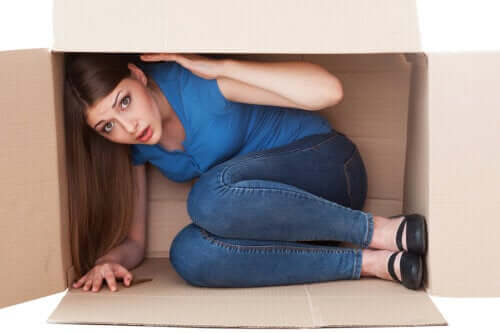How to Cope With Claustrophobia in 10 Easy Steps
How to Deal with Claustrophobia
People with claustrophobia may experience shortness of breath, rapid heart rate, and tremors, among others. Fortunately, there are some strategies to help manage it.

Claustrophobia affects many people. It's distressing and can easily get out of control if not managed properly. So, what's the best way to deal with it?
To begin with, you should know that claustrophobia is the uncontrollable fear of being in enclosed spaces, especially reduced ones. For example, some people experience it in elevators, subways, and airplanes.
What's claustrophobia?
As explained by some psychology studies and as mentioned above, claustrophobia is the fear of enclosed spaces. Again, those who must suffer from this disorder fear any situation that involves confinement.
Doctors usually diagnose it as a specific phobia, a seasonal subtype, according to the Diagnostic and Statistical Manual of Mental Disorders (DSM).
Symptoms of claustrophobia
These manifest differently in every individual. In general, all of them experience an uncontrollable fear of being in a confined, enclosed space. Other symptoms include:
- Chest pain
- Shortness of breath
- Fast heart rate
- Sweating
- Trembling
- Shortness of breath or hyperventilation
- Lightheadedness
- Nausea
- Fainting
- Dizziness
- Panic
In addition to these symptoms, there may be others that patients describe in therapeutic consultations.
Claustrophobia in certain places
The places where people most frequently experience claustrophobia are:
- Airplanes
- Telephone booths
- Tanning beds
- Elevators
- Enclosed bathtubs
- Caves
- Saunas
- Tunnels
- Ambulances
- MRI scan machines
The latest lockdown situation may be transitory but it's greatly distressing. There's still a fear of going outside as well as explicit restrictions in some countries to do so. Thus, this fear is exacerbated in some people. In fact, they may be experiencing noticeable symptoms of discomfort during confinement.
This type of phobia is similar to panic disorder, as well as to agoraphobia in some cases. For this reason, psychologists are currently investigating whether there are panic states in addition to the situations that specifically cause claustrophobia.
A claustrophobic person feels irrational fear in an enclosed situation and often can't even move or get themselves out of it. Also, they may experience shortness of breath, loss of control, and immobility, among others.
Any of this can happen even in small rooms that don't have a window, in basements, when wearing a helmet for sports purposes, and in many other situations.
As you can see, it's common for these people to prefer to be in the company of someone, leave a window ajar and just avoid certain situations and places. In turn, some may even self-medicate with anxiolytics in order to face similar situations they can't avoid.
How to overcome it
The past lockdown was rather unexpected but was a source of much stress for many, many people. This is because many of us aren't used to spending so much time at home and being in total confinement.
Of course, cases of claustrophobia multiplied and the spaces that used to be pleasant at home may now increase anxiety. People even begin to feel hot flashes, dizziness, and vertigo, just as if they were in an elevator.
This situation is much worse for those already diagnosed with claustrophobia, as their quality of life has only worsened. So what's a person to do under these circumstances? Well, nowadays, psychologists have the appropriate tools to address this disorder. Some of these are:
- Interoceptive exposure, with help, to direct the respiratory rhythm
- Cognitive restructuring in order to correct many of the misbeliefs people have
- Relaxation techniques, such as meditation, visualization, and yoga exercises
- Psychotherapy can help identify the origin of the fear and possible ways to overcome it
- Pharmacological treatment, but only when strictly necessary
Read about How to Overcome Fears
Final considerations
Every person must resort to their own coping resources when confronting a problem such as claustrophobia. Especially during situations like the recent lockdown. Willpower and practice can help overcome the symptoms. However, it's always a good idea to seek counseling in order to find other support techniques.
In addition, family and friends can be part of the process. In fact, support networks are essential in order to understand that everything will be all right. So, stay in touch, even if it's only over the phone.
Finally, many psychologists offer online consultations, some with discounts and others for free. Seeking their attention when symptoms get out of control is important to ensure your well-being.
Source: https://steptohealth.com/how-to-deal-with-claustrophobia/
0 Response to "How to Cope With Claustrophobia in 10 Easy Steps"
Enviar um comentário